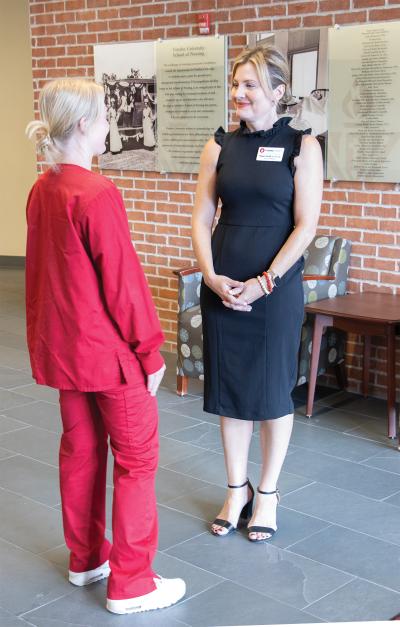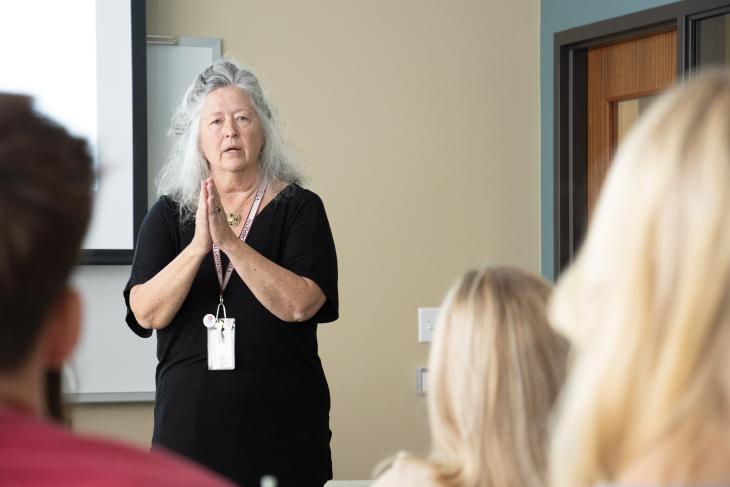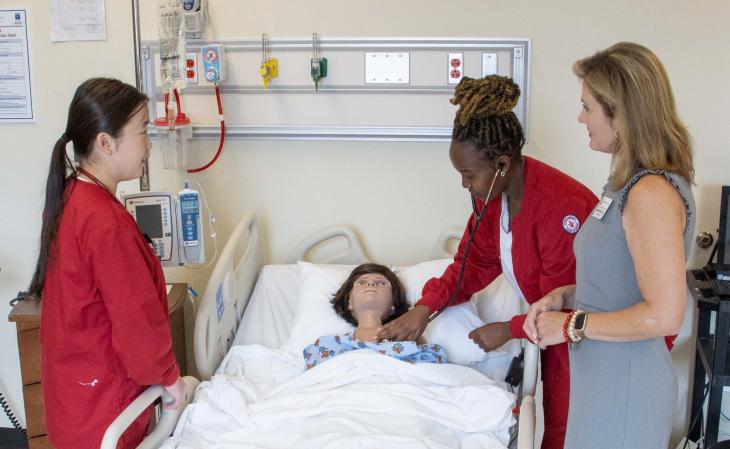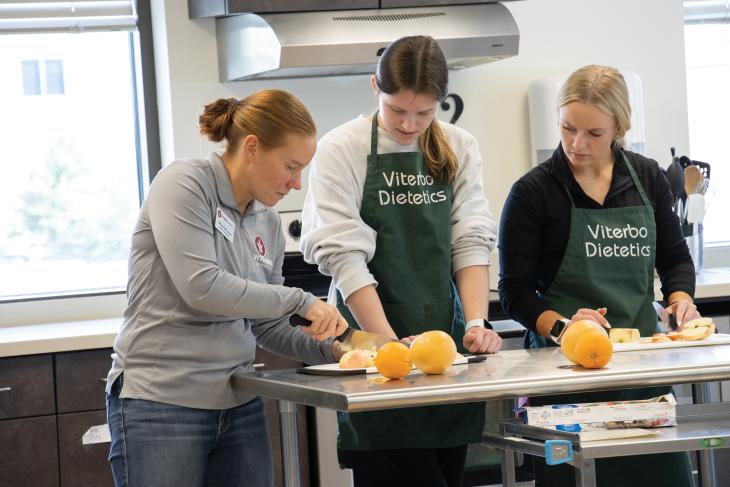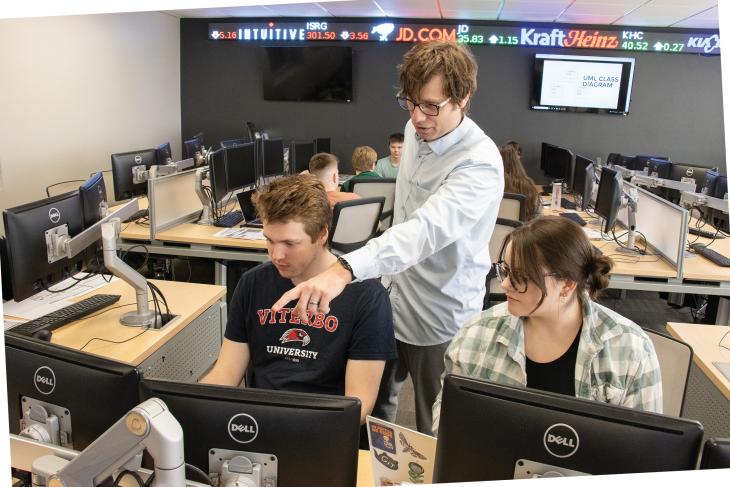After earning a bachelor’s degree in economics, Megan Smith embarked on a career in the business world before realizing that she had a heart for healing. She decided that, like her grandmother, mother, aunt, and brother before her, she wanted to be a nurse.
To make that happen she had to go back to square one, educationally speaking, earning bachelor’s and master’s degrees in nursing from the University of New Mexico. These days, there’s a better way at Viterbo.
Smith was named dean of Viterbo’s College of Nursing and Health last May, just as the university was graduating its first cohort of students in its Direct Entry Master of Science in Nursing degree program. The DEMSN program offers people looking at a career change, like Smith did, a way to get the training and clinical experience to become a registered nurse in short order.
This fall the university will see 28 new DEMSN students, almost double the 16 who graduated last spring.
Also this fall, Viterbo University welcomed its first cohort of undergraduate communications disorders majors as it prepares for the fall 2024 launch of a related academic degree offering, a Master of Science in Speech-Language Pathology (MSSLP).
In addition, Viterbo saw the master’s degree requirement coming in 2024 for registered dietitian nutritionists and in 2020 launched an accelerated 4+1 program to enable students to earn both a Bachelor of Science in Nutrition Sciences and a Master of Science in Community Medical Dietetics degree in five years. Since then, the university has gained high ratings on a national level for its dietetics and nutrition program.
New health science degrees and certificates—in nursing and beyond—as well as innovative enhancements in established programs that are responsive to the needs of employers and the labor market will play a vital role in keeping Viterbo strong for decades to come.
“We are all about innovation, working on building up professional programs in the health sciences, where Viterbo has always been so successful,” said Tonya Wagner, Viterbo’s vice president for academic affairs and institutional effectiveness. “That’s the wave of the future for Viterbo.”
All About Communication
To ride a wave into the future, a university needs to see it coming and strategize a plan to get on top of that wave instead of being dragged under. As Wagner explained, that means being in constant communication with community partners, the organizations that will employ the university’s graduates, and being ever-alert to market demands and higher education trends.
Viterbo’s new speech-language pathology degree programs are a prime example of wave spotting. There’s a high and growing demand for speech pathologists, both in K–12 schools and clinical settings, and the available slots in graduate degree programs fall far short of the need.
According to federal labor statistics, job opportunities for speech-language pathologists were projected to grow 21% from 2021 to 2031, far above the projected growth for other occupations. Meanwhile, graduate degree program slots nationally are so rare and demand is so high that a single C on an undergrad transcript could keep a student out of a speech pathology master’s program.
The university found the ideal person to launch the program in Patti Johnstone, a California native who built a private practice from the ground up as an audiologist and speech pathologist and ran it for 13 years before going into education. She spent 17 years at the University of Tennessee in Knoxville, where she was director of clinical education for audiology and speech pathology.
In Johnstone’s experience, many students come to the speech pathology field because of pivotal events in their own lives. It was certainly true for her.
Growing up, she and her family undertook a church mission in Nigeria. Johnstone’s youngest sister was born there and had chronic ear infections.
Coming back to the U.S. on a furlough, they were told they had two choices: go back to Africa at the risk of their daughter losing her hearing or stay and get the treatment she needed.
“My parents chose my sister’s hearing and speech development,” Johnstone said. “It had a profound impact on me.”
Johnstone expected at least 10 students this fall in the communications disorders bachelor’s degree program, some of them first-year students, others who are changing majors or transferring. Students who earn an undergraduate degree in communications disorders from Viterbo and meet the minimum requirements will be guaranteed a spot in the university’s MSSLP program.
Sim City
One thing those students and the master’s degree students to come will get at Viterbo they won’t get many other places is experience in a state-of-the-art nursing simulation lab.
“The simulation center allows us to create skills in a safe yet realistic setting, so when students leave they’re not learning to do this on the job,” Johnstone said. “We’re in a unique position to do this well. I don’t know many speech pathology programs that offer access to this kind of simulation.”
This fall, the sim lab will gain a premature infant mannequin, Baby Paul, thanks to an anonymous donation.
Johnstone’s students, of course, will get real-life clinical experiences as well, both in schools and clinical settings.
Getting enough practicing speech pathologists to serve as clinical supervisors might be the factor most likely to limit growth of the program. She is optimistic about that, though, because of her recent hiring of the program’s director of clinical education, Aeriana Culpitt, who was a clinician for Gundersen and has a great network of professional contacts.
“Coming here to start a new program was quite terrifying on some levels, but it was also very exciting to know I could put together a whole team and decide on what the focus of the program would be,” Johnstone said. “The other thing is the people I met in the interview here were not only very, very nice, they were smart and super excited about what this program might bring to the university.”
Teamwork
Viterbo’s innovative programs aren’t created in a vacuum. It takes collaboration and communication with partners in the community, no matter the academic area but especially in health sciences with two major medical centers in La Crosse.
“Partnership is a growing necessity for us to be successful in our mission,” said Dr. Scott Rathgaber, CEO of Gundersen Health System and a 2022 graduate of Viterbo’s Master of Arts in Servant Leadership program. “Viterbo is a huge asset in our community, showing us how leadership should happen and how you serve the community based on the Franciscan Sisters’ legacy. I’m proud to work with Mayo and the Sisters and Viterbo. There are so many great organizations in this community. We can do more together than we can by ourselves. I tell our staff that all the time.”
One thing that has come out of conversations with Gundersen and Mayo is the idea that the simulation lab could be even more realistic if students from different disciplines work with patients together. In a clinic or hospital, for example, a nurse, a dietitian, and a speech pathologist could all be working with the same patient and would no doubt provide better care through collaboration.
“I think where we can improve and where we will improve in the next two years is creating more interdisciplinary experiences for our students,” Smith said. “What that looks like is working with a patient in the simulation center who maybe has had a stroke and is working with nursing students for nursing care, working with speech-language pathologists to provide therapy, and nutrition and dietetics for the nutritional support. It looks like a collaborative simulation where all disciplines are working together and communicating to provide the best outcome. That’s what happens in real life.”
Faculty members in different disciplines are looking at curriculum, competencies, and outcomes to identify areas that would work well for interdisciplinary collaborations, and Smith is optimistic that their efforts will soon bear fruit.
“We have an excited faculty, and that’s the first step. They’re on board and excited about it and looking toward the future,” she said. “It is our focus in the college to start thinking about this interdisciplinary framework and how we are going to introduce it to our students early so that when they are in practice they realize that one part is not stronger than the other but rather we’re part of a team and ultimately it’s for the best outcome for the patient.”
Data Science
Another need health care providers have highlighted recently involves a skill that might not on the surface seem important in the care of patients: data analytics.
“Technology is the next big skill gap,” Wagner said. “We’re hearing there is a real struggle with getting all the people who run a hospital to have really great technology skills. Data analytics is key for making evidence-based decisions for medical care and continuous quality improvement.”
Graduate programs certainly require data analysis, but Smith said the need for more analytics in the health care field goes across the board.
“Health care is becoming more and more complex, so we need to be able to interpret data and interpret results more quickly so that we can make informed decisions for our patients,” Smith said. “It’s something we’re looking at very closely. You have to be savvy about informatics and how information is processed to be successful in a health care climate that is rapidly growing and changing.”
The potential applications for data analytics expertise, of course, go beyond health sciences. Business school graduates certainly need that skill and experience in their toolbox, as do students who major in sciences.
“What employers in so many fields really need is people who understand big data,” said Michael Alfieri, dean of Viterbo’s College of Engineering, Letters, and Sciences.
It’s worth noting, Alfieri said, that about 85% of students who major in neuroscience, biochemistry, and biology are on track to go into health care after getting advanced training after graduation, such as medical school.
In the Viterbo computer science bachelor’s degree program launched last fall, data science is one of the four concentration tracks offered. Data analytics skills could be developed in other academic areas by incorporating it into existing curriculum or adding new classes. There’s a possibility of creating a data science minor or even a new major in the Dahl School of Business, though those discussions are in the very early stages.
Some science majors already are getting advanced informatics experience through data-driven internships. With these kind of internships, which started at least five years ago at Viterbo, a student goes into a clinical setting and does a research project initiated by the business.
The resulting research benefits the host by answering a pressing question as well as serving as a capstone project for the students.
Data-driven internships have been done in a variety of clinics and offices, from dental and chiropractic offices to a company that makes prosthetic limbs.
“It’s a unique approach, where the learning even goes beyond their field of study,” Alfieri said. “Ultimately, we want them, as undergraduate students, to gain a familiarity with what it means to be a scientist.”
